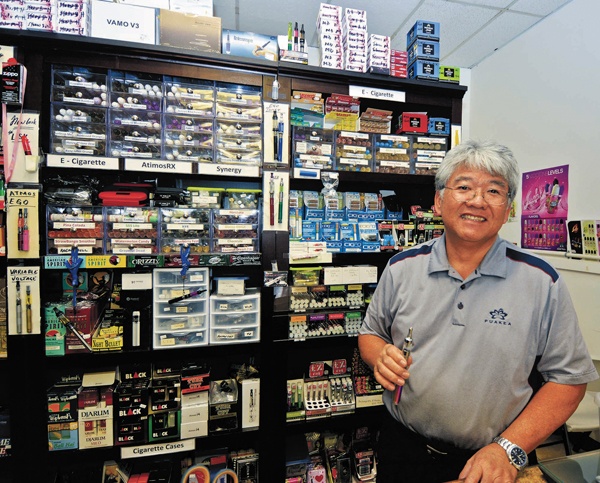LIHUE — Just like the real ones before them, electronic cigarettes are getting the boot from some public spaces.
The Hawaii Department of Health announced this week it will ban the use of electronic smoking devices — commonly known as e-cigarettes — at all DOH facilities.
The directive, which takes effect Jan. 1, is the first of its kind among Hawaii state departments, but it is leaving some e-cig users feeling ostracized even though they say their product is safer than nicotine cigarettes.
All six DOH facilities on Kauai — those in Lihue, Kapaa, Hanapepe and Waimea — will be subject to the new policy, according to John Hunt of the DOH’s Kauai District Office.
Although he did not know the specifics as of Tuesday, Hunt said it was his hope the restriction would include the 20-foot buffer zone around doorways that currently exists for regular tobacco products.
The new policy will not only apply to all DOH employees, but also visitors, volunteers, contract workers and delivery personnel. The department said in a press release issued Monday that the unrestricted use of such devices is “potentially hazardous to health.”
While the health risks, or lack thereof, haven’t been proven one way or the other, DOH Tobacco Settlement Programs Manager Lola Irvin said using the devices threatens Hawaii’s smoke-free laws, which are designed to protect the public from the harmful effects of tobacco and nicotine.
“While electronic smoking devices are touted for being smoke free, they have not been proven safe,” she said in the release. “These devices release nicotine and other chemicals and carcinogens into the environment, leaving those around them exposed to the potentially harmful vapor — just like secondhand smoke.”
Others are less convinced.
Marie Gonsalves, owner of MG’s Sweet Vapor, said she has witnessed a number of people wean themselves off of not only real cigarettes, but also electronic ones by using her products.
Local doctors and dentists have even referred their patients to her, she said.
“I don’t see anything wrong with it,” she said. “How is it harmful? It’s just a vapor that goes up into the air and it disappears.”
An asthmatic, Gonsalves compared using e-cigarettes to a nebulizer for asthma treatment. Neither should be banned indoors, she said.
Electronic smoking devices, which have grown increasingly popular in the past few years, use heat to vaporize liquid nicotine.
The DOH says this simulates cigarette smoking, thereby reversing the progress that has been made in establishing a social norm that smoking is not permitted in public places and places of employment.
In addition to the potential health risks, the devices “confuse the public who expect a smoke-free environment,” Irvin said.
Eun Chae Kwon, owner of Ohana Smoke Shop in Lihue, said that while she believes they are “way healthier” than real cigarettes, she has no problem with the DOH policy or with keeping them from being used indoors.
“It might be not (as) bad for secondhand or anything like that, but it don’t look good,” she said.
Gonsalves questions how the DOH and others can claim e-cigs are harmful without providing any data in support.
“Do they have anything proven that it’s unsafe?” she asked. “They try to compare it to actual cigarettes, when it’s not at all.”
The DOH said the new policy was one of the last policies signed by the late Director of Health Loretta Fuddy, who died earlier this month in a plane crash off Molokai.
Irvin said in the release that Fuddy believed it was the DOH’s responsibility to set the standard for health for the people of Hawaii.
“Today, we are taking a stand to protect our workers and our public,” Irvin said. “We hope to inspire others to take a similar position and join us in carrying out her legacy.”
Currently, there are no county laws restricting the use of electronic cigarettes on Kauai.
• Chris D’Angelo, environmental reporter, can be reached at 245-0441 or cdangelo@thegardenisland.com.





